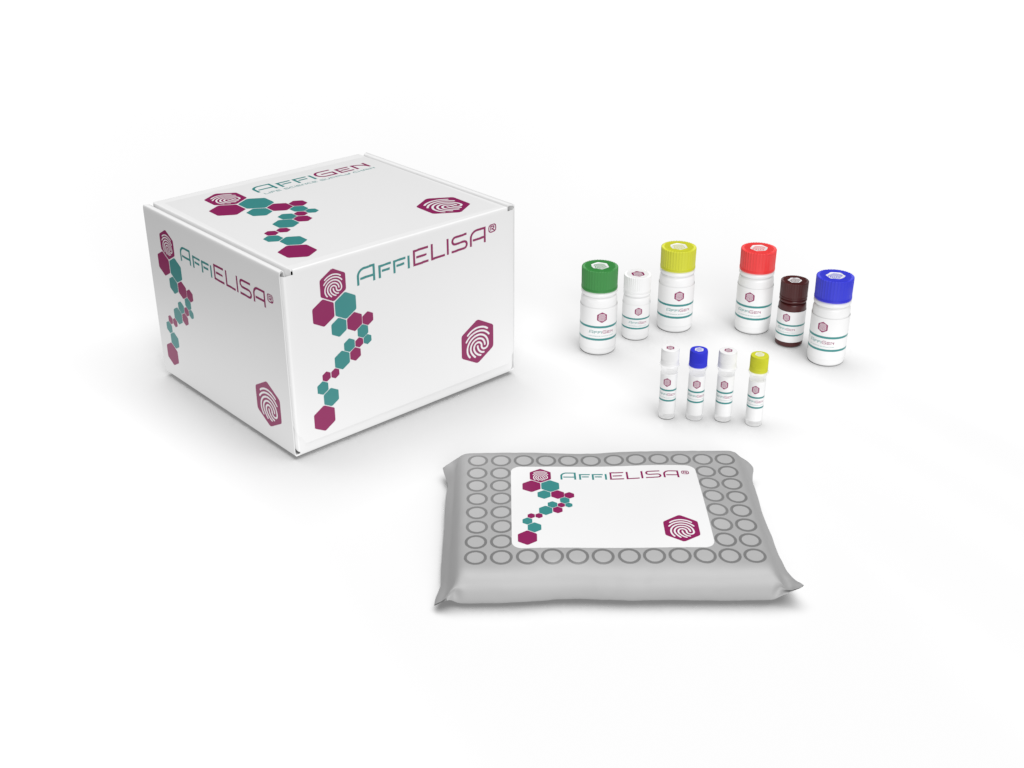AffiELISA® Human integrin alpha vitronectin Beta 3 | αVβ3 | ELISA Kit
The AffiELISA® Human Integrin Alpha Vitronectin Beta 3 (αVβ3) ELISA Kit is a laboratory tool designed for the quantitative measurement of αVβ3 integrin levels in human samples.
Integrins are cell surface receptors that play crucial roles in cell adhesion, signaling, and interactions between cells and their surrounding environment. The αVβ3 integrin, specifically, is known to interact with various extracellular matrix proteins, including vitronectin, and is involved in cell adhesion and migration processes.
ELISA (Enzyme-Linked Immunosorbent Assay) is a commonly used laboratory technique that utilizes specific antibodies to detect and quantify specific proteins or molecules in biological samples. This kit employs antibodies that specifically recognize αVβ3 integrin, enabling the precise measurement and quantification of its concentration in human samples.
αVβ3 integrin is of particular interest in biomedical research due to its involvement in various physiological and pathological processes, including angiogenesis (the formation of new blood vessels), cell migration, and certain diseases like cancer and bone-related disorders.
By quantifying αVβ3 integrin levels using ELISA kits like the AffiELISA® Human αVβ3 Kit, researchers can gain insights into its expression patterns in different biological conditions, its role in disease progression, and its potential as a therapeutic target. Studying αVβ3 integrin may provide valuable information for understanding cellular interactions, disease mechanisms, and developing targeted therapies in various medical fields.
Product Specifications
Species
Human
Gene / Target
αVβ3
Uniprot ID
N/A
Type
N/A
Sample Volume
10 µL
Wavelength
450nm
Human integrin alpha vitronectin Beta 3 Background
The integrin alphaV beta3 (αVβ3) is a cell surface receptor belonging to the integrin family, known for its involvement in cell adhesion and signaling processes. This specific integrin plays a significant role in interactions between cells and their surrounding extracellular matrix components.
Here are key aspects of the alphaV beta3 integrin:
- Structure: Integrins are heterodimeric proteins composed of an alpha and beta subunit. AlphaV beta3 specifically consists of the alphaV subunit paired with the beta3 subunit.
- Function: AlphaV beta3 is involved in cell adhesion to various extracellular matrix proteins like vitronectin, fibronectin, and others. It plays a role in mediating cell migration, proliferation, and signaling pathways related to cell behavior.
- Angiogenesis: This integrin is particularly notable in angiogenesis, the process of forming new blood vessels. AlphaV beta3 is involved in endothelial cell migration and regulates the formation of new blood vessels, making it a target of interest in anti-angiogenic therapies for certain diseases, including cancer.
- Disease Implications: AlphaV beta3 is associated with various diseases, including cancer metastasis, osteoporosis, and cardiovascular diseases. It's considered a potential therapeutic target due to its involvement in these pathological processes.
Studying alphaV beta3 integrin, including its expression patterns, interactions, and signaling pathways, is of great interest in biomedical research. Specialized tools like ELISA kits enable the quantification of alphaV beta3 levels in biological samples, aiding in understanding its roles in normal physiology and disease pathogenesis. This knowledge contributes to potential advancements in developing targeted therapies for conditions associated with alphaV beta3 dysregulation.
